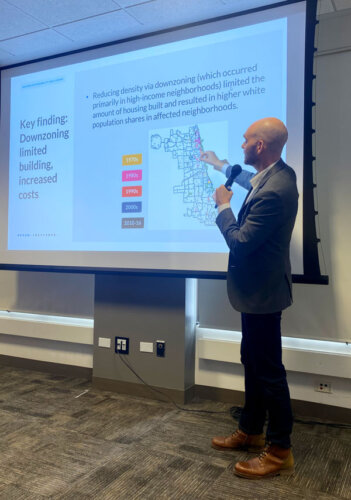Untangling Zoning Impacts and Promoting Equity Through Reform: Event Recap

MPC Sparks Zoning Reform Conversations Following Panel Featuring National Thought Leaders
On July 24, 2024, over three hundred people from around the world tuned in to “Untangling Zoning Impacts and Promoting Equity Through Reform,” a hybrid moderated panel with national thought leaders about zoning and land use. The event started with a quick primer exploring zoning basics and history. Zoning is a regulatory force that for better or worse shapes how we experience our neighborhoods. The eye-opening panel was moderated by Morgan Malone (social change leader and Executive Director of City Bureau) and featured panelists from around the country who have been researching and writing about zoning policy:
- Yonah Freemark, Director of Urban Institute’s Land Use Lab and MPC’s research partner investigating the impacts of zoning on public health, racial equity and sustainability
- Sara Bronin, Founder/Director, National Zoning Atlas and author of Key to the City: How Zoning Shapes Our World
- Nolan Gray, professional urban planner and author of Arbitrary Lines: How Zoning Broke the American City and How to Fix it

The panelists took turns sharing their responses to thought-provoking questions while taking audience questions throughout the event. Some highlights from the conversation include:

When asked “how has zoning shaped the city you call home?” Yonah started the discussion about “an interesting example of how we can use zoning to have disagreements and perhaps advance a better society as we wish.” The property on U Street in particular was near his house in Washington, DC which often erupted a community debate. Sara was raised in Houston, which famously is a major city that does not have zoning regulation. After completing architecture school, Sara became fascinated about “the rules that control our lives” and is now documenting and digitizing zoning codes all over the country at the National Zoning Atlas. Lastly, Nolan Gray shared his experience in California as a researcher for the California YIMBY (Yes In My Back Yard) organization, coming particularly from Los Angeles, a car-centric city. “I think Los Angeles was at the forefront of dealing with a lot of zoning issues that many other cities are now increasingly reckoning with.”
Chicago, like many other cities, has been grappling with a housing crisis, where Americans are locked out of available and affordable housing. Chicagoans have also been acutely struggling with the mismatch between noxious industry located near housing and parking reform since the “parking meter deal” of 2008. Other major cities have begun piloting zoning reforms where several municipalities have eliminated parking minimums or have modified the required lot size or set back of buildings. Some specific examples shared during the panel included Minneapolis or most recently, Berkeley, which abolished single-family zoning or in California where they have eased restrictions statewide on accessory dwelling units (ADUs). The panel discussion also explored other connection points including housing, transportation infrastructure, green infrastructure and even high-quality schools and on the flip side, zoning impacts on gentrification and displacement and community and cultural protections and preservation.
You can tune into the full event recording here (transcript). This event is part of Metropolitan Planning Council’s Zoning Assessment in partnership with Urban Institute. The three-year project looks to assess the City of Chicago’s zoning and land use practices and processes to develop a shared understanding of the equity, sustainability and health impacts on its residents and communities. Ultimately, we will evaluate and identify areas for improvements with the current zoning code and recommend citywide revisions. By understanding how we can make changes that equitably benefit Chicago’s communities, the City will be able to realize reform through regulatory forces.

A work session immediately followed the panel where Chicagoans shared their feedback to initial outcome analysis research about housing. As MPC continues to review the City of Chicago’s zoning code, map, and processes, we encourage you to stay involved in the project. Stay tuned as we continue to recruit members to participate in upcoming events, interviews and focus groups!